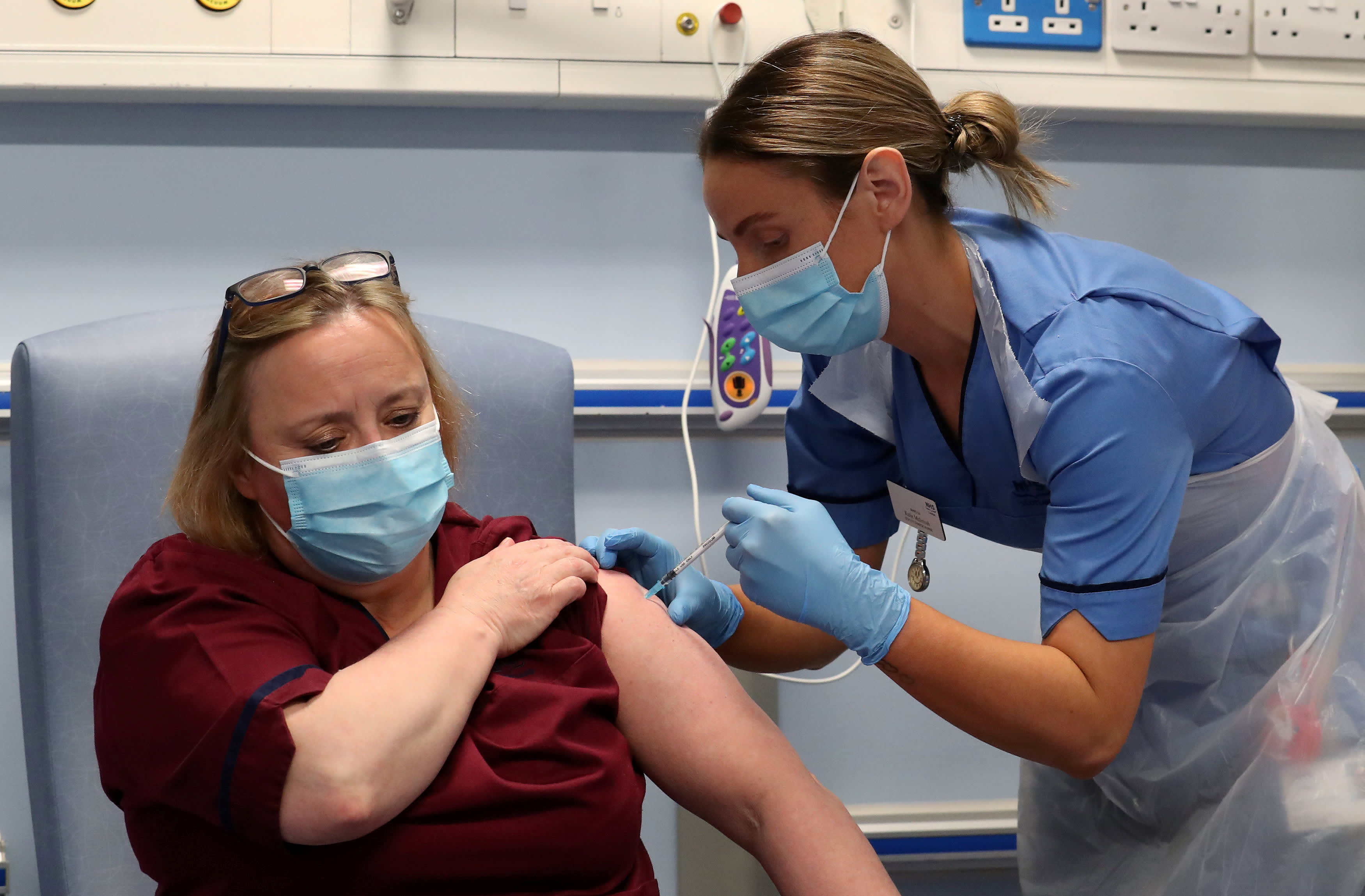The two allergic reactions reported by U.K. health-care workers vaccinated against Covid-19 will likely be scrutinized by the Food and Drug Administration as it decides whether to authorize Pfizer‘s vaccine in the U.S. — though the incident shouldn’t be surprising, medical experts said on Wednesday.
The U.K’s Medicines and Healthcare products Regulatory Agency updated its guidance on Wednesday to advise people who have a history of “significant” allergic reactions to forgo the vaccine developed by Pfizer and BioNTech. The updated guidance came after two members of Britain’s National Health Service experienced allergic reactions to the shot, though both are recovering well, according to the national medical director for the NHS.
“We know from the extensive clinical trials that this was not a feature, but if we need to strengthen our advice now that we have had this experience in vulnerable populations, the groups selected as a priority, we get that advice to the field immediately,” Dr. June Raine, head of the MHRA, told a U.K. government select committee on Wednesday.
While the Food and Drug Administration will likely review the events in the U.K. before authorizing Pfizer’s vaccine in the U.S., it’s not unusual that people with severe allergic reactions to vaccines aren’t included in clinical trials, said Moncef Slaoui, chief science advisor for the White House’s Operation Warp Speed, said during a press briefing on Wednesday.
The FDA is set to convene a meeting of its Vaccines and Related Biological Products Advisory Committee, or VRBPAC, on Thursday to review Pfizer’s Covid-19 vaccine for emergency use authorization in the United States. If the meeting goes well and the committee votes to approve the vaccine, the FDA could announce its authorization “within days,” Health and Human Services Secretary Alex Azar told ABC News’ “This Week” on Sunday.
“My expectation is that this is new news, and I would assume — but of course the FDA will make those decisions — that tomorrow this will be part of the consideration,” Slaoui said. The FDA declined to say whether the committee would discuss the U.K. events, but a spokeswoman pointed to Thursday’s meeting agenda that includes time for reviewing vaccine safety.
Dr. William Schaffner, a professor of infectious diseases at Vanderbilt University Medical Center, echoed Slaoui’s remarks in an interview with CNBC on Wednesday, saying that people with chronic underlying health conditions or those who may have severe allergic reactions are commonly excluded from vaccine trials.
If the FDA doesn’t discuss the allergic reactions during the meeting on Thursday, it’s possible they will be discussed during a meeting with the Center for Disease Control and Prevention’s Advisory Committee on Immunization Practices in the coming days, he said. The committee develops recommendations on how to use vaccines to control diseases in the United States, according to the CDC.
However, the allergic reactions shouldn’t interfere with the vaccine’s authorization, he added. It’s the sort of issue that the committee “deals with routinely because lots of vaccines are associated with allergic reactions in some small percentage of the population,” Schaffner said.
“They may indeed try to exclude certain people for a period of time, or make the recommendation that every vaccination site have equipment in place so that they can deal efficiently with allergic reactions,” he said. “They may make the recommendation that people should be observed for a short period of time after their vaccination.”
Schaffner said the U.K.’s decision to temporarily halt people with a history of severe allergic reactions from getting Pfizer’s vaccine is “a perfectly reasonable thing to do” as they investigate the incidents further. He said it shows that “the system is working and working very efficiently because we would do exactly the same thing here in the U.S.”
Dr. Syra Madad, senior director of the systemwide special pathogens program at New York City Health + Hospitals, said on Wednesday that the allergic reactions in the U.K. are “certainly nothing to be extremely surprised about,” but warrant further investigation.
Madad added, however, that the U.K. should’ve investigated the cases further before they issued “a blanket statement” advising people with severe allergies against getting vaccinated.
“A lot of these things are going to happen as these massive campaigns roll out,” Madad told MSNBC. ”I think this is something to be expected.”
— CNBC’s Holly Ellyatt and Berkeley Lovelace Jr. contributed to this report.
